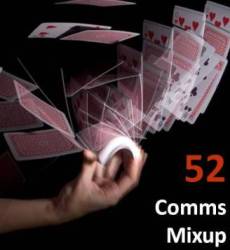If getting retweeted is your idea of a strong online relationship, you might want to think again. (Image credit: wordsdoneright.blogspot.com)
You’re online relationships aren’t as strong as you think. There, I said it. I’ve been thinking a lot about relationships this past week. Don’t worry, I’m not going to go all Dr. Drew or Dr. Phil on you in this post. I don’t even know any celebrities who need rehab. And I sure as hell don’t know anyone who needs the Stuart Smalley speech on a couch from a guy rockin the Magnum P.I.-wannabe mustache during sweeps week.
So what makes me an expert on relationships then? Well, nothing really. But with the ever-growing popularity of The Facebook and The social media (Shouldn’t we put a “the” in front of all digital social media references from now on?), I think we’re losing some perspective on our online relationships and the value of face-to-face interaction. Or to be more blunt — we’re overvaluing the connections we make online big time! Because as much love as we give social media these days, 93 percent of WOM still happens offline.
1. The blind date. Your friend says they know someone you should meet. The person’s on your radar and you’re aware of them. You may be intrigued. But the recent Dateline episode you watched on a first date gone wrong may cause you to just avoid the whole thing entirely.
This relationship is comparable to traditional advertising, marketing and PR. It’s the weakest possible connection you could have with another person or brand. It’s not even a relationship, first of all. It’s basically a “Hey, let me shout some stuff about me and who I am because there’s a small chance you might care” relationship. Sometimes, it goes a bit deeper than that. But not often.
2. The freshman 15 friends you don’t talk to that much anymore. Think about your freshman year of college. You met some new friends first semester. And then by sophomore year you weren’t really hanging out with most of them anymore? That’s more likely to happen with folks you meet at this stage in the game.
This connection is stronger than the first one. You’ve actually talked to the person. But in the grand scheme of things, it’s still pretty weak. If you wanted someone to donate $5 to a charity you support, your social media connections might be willing to do that. At least some of them. But if you needed a group of people to volunteer with you at an event for that charity, who’s more likely to make the time? Someone you know well personally, or someone who retweets your blog posts a lot?
3. The coworker and occasional happy hour friend. Think about a colleague at your job. You know each other fairly well. You’re more likely to talk about business, but you also share personal stories. In order to work well together, you have to be able to communicate. And most of the time, you genuinely like each other and might even hang out some outside of the office every now and then.
This is the most valuable type of relationship you can build via social media without meeting someone in person. And it takes a lot of effort. It’s not just a blog comment here and a retweet there. You have to consistently talk to the person through your social channels. And you can’t stop and start. It’s too easy to fall off of the person’s radar.
4. The IRL friend. Think about your friends from your community; the ones you see offline regularly. Friends with whom you don’t work. Friends who aren’t just avatars and blog urls.
Your social media relationships will always grow and evolve once you’ve had the chance to meet in person. In fact, think about some of the online personalities you respect the most and ask yourself how often those folks get out from behind their computers and meet people. Or how much time they spend online actually talking to people versus just retweeting and liking posts.
People want to be friends with people they know and trust. The same criteria as who they want to work with. And those people are the ones they’ll advocate for the most. It’s a pretty clear point if we don’t let the glare off the shiny social media tools cloud our vision.
And if you’re reading this and realizing that building the best kind of relationships takes a lot of time and effort, then good…because that was the point. To quote Tom Hanks from A League of Their Own: “If it was easy, everybody would do it. It’s supposed to be hard. The hard it was makes it great.” Relationships are the key cog to happiness in life and success in work. And the stronger they are, the more valuable they can be in both situations.
I think a key question is: “Do we focus on knowing lots of people, or knowing a few people really well?”





So which category are we?
My latest conversation: We Interrupt Your Regularly Scheduled Programming
- spam
- offensive
- disagree
- off topic
Likeginidietrich I would say we are leaning toward No. 4. We have met IRL and we also talk consistently online and not just about business, but also about things like conforters :). The difference between No. 3 and 4 isn't much. But the difference between 2 and 3 is HUGE. And too many people think a retweet here and a like there mean a solid connection. But those relationships are pretty weak in the end until taken to level 3 or 4, IMO. What do you think, ginidietrich?
- spam
- offensive
- disagree
- off topic
LikeI don't know. I think a RT here and there makes a great friend. :)
My latest conversation: Use the Tool, Don't Be a Tool
- spam
- offensive
- disagree
- off topic
Like